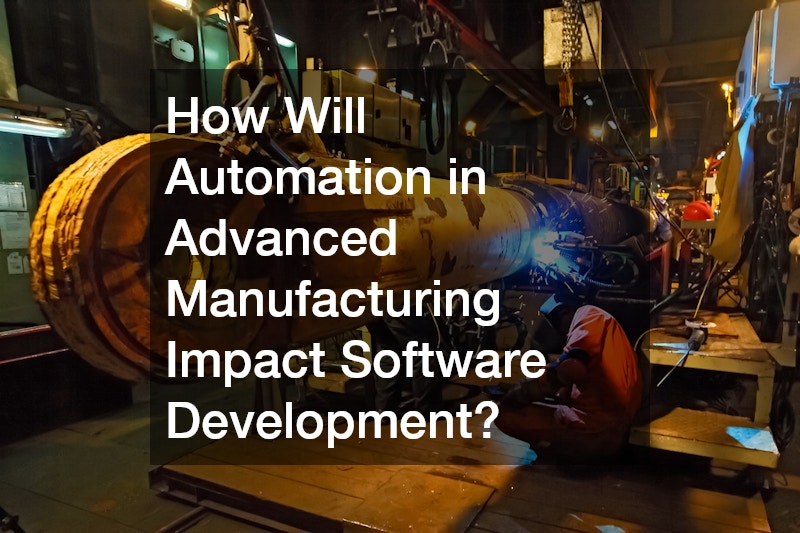
In the rapidly evolving landscape of technology, the intersection between software development and advanced manufacturing is becoming increasingly significant. This article explores three key reasons why software developers need to engage with the advancements in the manufacturing sector. These developments not only reshape production techniques but also offer numerous avenues for digital transformation and innovation.
How Will Automation in Advanced Manufacturing Impact Software Development?
Automation in advanced manufacturing heavily relies on software to synchronize and control operations across production lines. As factories embrace Industry 4.0, seamless integration between software and automated machinery is paramount. Developers play a crucial role in building robust software systems that ensure efficient machine-to-machine communication, effectively bridging the gap between physical and digital realms.
With automation becoming a staple in manufacturing, the emphasis on software-driven process optimization grows. Sophisticated algorithms enable real-time process monitoring and refinement, enhancing productivity and minimizing waste. The rise of digital twins, virtual replicas of physical processes facilitated by software, exemplifies this shift towards a more integrated approach.
Furthermore, these software systems must be versatile enough to accommodate constant shifts in production demands. Customizable automation solutions are becoming the norm, requiring developers to design adaptable frameworks. This dynamic landscape presents both a challenge and an opportunity for software professionals to innovate and reinvent traditional models.
Advanced manufacturing calls for the development of highly sophisticated control systems, where software plays a pivotal role. As processes become more intricate, there’s a profound need for systems capable of managing complexities with precision. This surge in demand for advanced control architectures presents an enticing challenge for developers to create innovative, resilient solutions.
The integration of control systems in manufacturing enhances flexibility, enabling factories to swiftly transition between different product lines. Developers are tasked with designing software that supports quick recalibration and adaptability to produce diverse outputs efficiently. Consequently, the field is ripe with opportunities for software-driven innovation in control system development.
What Role Does Artificial Intelligence Play in the Future of Manufacturing?
Artificial intelligence is revolutionizing product design by enabling mass customization while maintaining efficiency. Through AI, manufacturers can tailor products to customer preferences at scale, crafting bespoke solutions. This shift is driven by software algorithms that analyze customer data and facilitate personalized experiences.
Manufacturers leverage AI-powered design tools to streamline the creation of complex products, reducing time and cost. Developers play a key role in creating these intelligent platforms, harnessing machine learning to predict design outcomes. Such capabilities enable faster iterations and innovations responsive to dynamic market needs.
Consequently, AI catalyzes the customization movement, underpinned by sophisticated software ecosystems. Developers specializing in these platforms are at the forefront of transforming traditional manufacturing processes. Their work empowers manufacturers to meet the burgeoning demand for personalized, high-quality products.
AI’s transformative potential in manufacturing is largely attributed to its impact on operational efficiency. By applying AI to analyze and optimize production workflows, manufacturers can achieve significant cost savings. Software solutions equipped with AI enable real-time data analysis, facilitating proactive decision-making.
The integration of AI into manufacturing processes reduces downtime and enhances resource allocation. For developers, this translates into designing intelligent systems that can autonomously manage production schedules. These systems provide the agility required to respond swiftly to market fluctuations.
Why is the Internet of Things (IoT) Significant in Manufacturing?
The introduction of IoT in manufacturing has driven advancements in real-time monitoring and data collection. IoT devices collect vast amounts of data from interconnected machines and systems, enabling detailed insights into manufacturing operations. Developers are at the forefront of designing platforms that process and analyze this data to enhance operational outcomes.
The real-time visibility offered by IoT solutions empowers manufacturers to make informed decisions swiftly. Software designed to interpret IoT data facilitates prompt responses to production anomalies, minimizing potential risks. These systems provide an additional layer of intelligence, automating responses to complex production scenarios.
Moreover, developers must address the dynamic nature of IoT systems, ensuring their adaptability to evolving manufacturing environments. By crafting solutions that integrate seamlessly with various devices, developers enable the full potential of IoT in manufacturing. Their efforts support continuous innovation within the industry, driving efficiency and scalability.
As IoT adoption escalates, the need for robust IoT-integrated manufacturing systems becomes increasingly pressing. These systems must connect various digital and physical assets, spanning machines, devices, and sensors. Developers are crucial in creating the software infrastructure that facilitates such extensive connectivity.
The challenge lies in building scalable solutions that can efficiently manage large volumes of IoT data. Developers must design frameworks that ensure seamless communication between disparate components and systems. This task involves creating interoperable applications capable of orchestrating complex manufacturing processes.
The integration of new technologies such as automation, AI, and IoT in advanced manufacturing represents not only a transformation in production but also offers exciting challenges and opportunities for software developers. Understanding these trends is crucial for developers looking to innovate and stay relevant in the tech-driven future of manufacturing. As the industry evolves, software development will continue to be a driving force in the revolutionary changes reshaping the manufacturing landscape.
.

